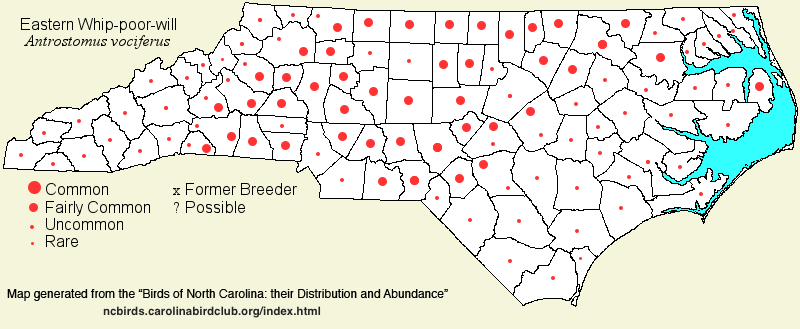 |  |
|
Eastern Whip-poor-will - Antrostomus vociferus CAPRIMULGIDAE Members: | Search Common: Search Scientific: |
|
|
|||||||
| General Comments |
More than 30 or 40 years ago, the Whip-poor-will was the most common or at least the most familiar goatsucker in the state. However, the Chuck-will's-widow, always common in the Coastal Plain, has been slowly expanding westward into the Piedmont and low mountains; the Whip-poor-will seems to have undergone a considerable decline in recent years in the mountains and Piedmont, though this might be more due to habitat loss and a reduction in flying insects as opposed to displacement by Chuck-will's-widows. Yet, oddly enough, the Whip-poor-will has actually been expanding its breeding range eastward into the eastern Coastal Plain, almost to the coast! It has taken advantage of pine plantations and ditched swamp forests, where it is the primary nesting goatsucker species in the wetter pine and mixed stands in the lower Coastal Plain. This appears to have taken place only since the 1950's or 1960's, since the advent of extensive conversion of swamp forests, pocosins, and flatwoods into pine plantations. Whip-poor-wills favor upland (dry to mesic) woodlands and forests for nesting, usually not far from fields or openings. They are not normally flushed from bottomlands or deep inside forests. The species winters sparingly along the coast, to an undetermined extent. NOTE: Because the Whip-poor-will in the southwestern deserts/mountains was split off from the full species, in 2010, as the Mexican Whip-poor-will, the remainder of the species now has a new (and awkward) common name -- Eastern Whip-poor-will. (This sounds like a subspecies name, rather than a full species name.) In addition, the genus name was changed from Caprimulgus to Antrostomus in 2012. | ||||||
| Breeding Status | Breeder | ||||||
| NC BRC List | Definitive | ||||||
| State Status | W | ||||||
| U.S. Status | |||||||
| State Rank | S4B | ||||||
| Global Rank | G5 | ||||||
| Coastal Plain | Breeding summer resident, and winter visitor (resident?) along the coast. Uncommon to fairly common in the northern half of the province, south to Carteret; uncommon in most of the southern half, though possibly increasing; uncommon to fairly common, but declining, in the Sandhills. Absent as a breeder from the immediate coast (islands). Rare to possibly uncommon winter resident, at least through Dec, and sparingly into early Feb, along the southern coast, north to (Carteret); very rare to casual in winter farther north near the coast, and generally absent to casual in winter farther inland. Whether any Whip-poor-wills actually survive the entire winter in the state is unknown, as there appear to be no records beyond early Feb, except for one found dead on 11 Feb 2007 at Gloucester (Carteret). Normally arrives in mid- to late Mar, departing in Oct (?); numerous Dec, Jan, and early Feb records. Peak counts: 54 (most or all likely on territory), Croatan National Forest 4 May 1999; 14, Green Swamp (Brunswick), 15 Jun 1988. | ||||||
| Piedmont | Breeding summer resident, declining. Formerly (prior to 1980), fairly common to common across the province, but now mainly only fairly common, seemingly being "replaced" by Chuck-will's-widows in many areas; probably now uncommon in some local regions. Casual in early winter, with four records in Dec-Jan, the latest on 2 Jan. Normal dates are late Mar to mid- or late Sep, with departure dates poorly known because of quiet and nocturnal nature. A number of arrival dates in early Mar. Peak counts: 131, Chapel Hill spring count, 11 May 1980; ? | ||||||
| Mountains | Breeding summer resident, declining. Formerly (prior to about 1980), fairly common at lower elevations, and uncommon at middle elevations. Now mostly uncommon, to locally fairly common, in lower elevations (below 3,000 feet); uncommon at best above 3,000 feet. Arrives in early Apr (rarely in Mar), but departure poorly known, mostly in Sep? Peak counts: ? | ||||||
| Finding Tips |
The tips are the same as for the Chuck-will's-widow. The roadside driving method is best, but finding suitable roads can be a problem. Logging roads, which are almost always dirt, are good for spotting these species.
This species can sometimes be called up in winter along the coast, mainly during mild weather conditions. By playing a tape of the "song" at night, a Whip-poor-will (if present) may either fly out toward the tape or give an excited, low, growling "wurk, wurk" call. Sometimes,a "whip" call, or even the full "song", can be heard. *** | ||||||
| Attribution | LeGrand[2023-03-03], LeGrand[2018-02-02], LeGrand[2013-11-11] | ||||||
| NC Map Map depicts all counties with a report (transient or resident) for the species. | Click on county for list of all known species. |
| NC Breeding Season Map Map depicts assumed breeding season abundance for the species. |  |